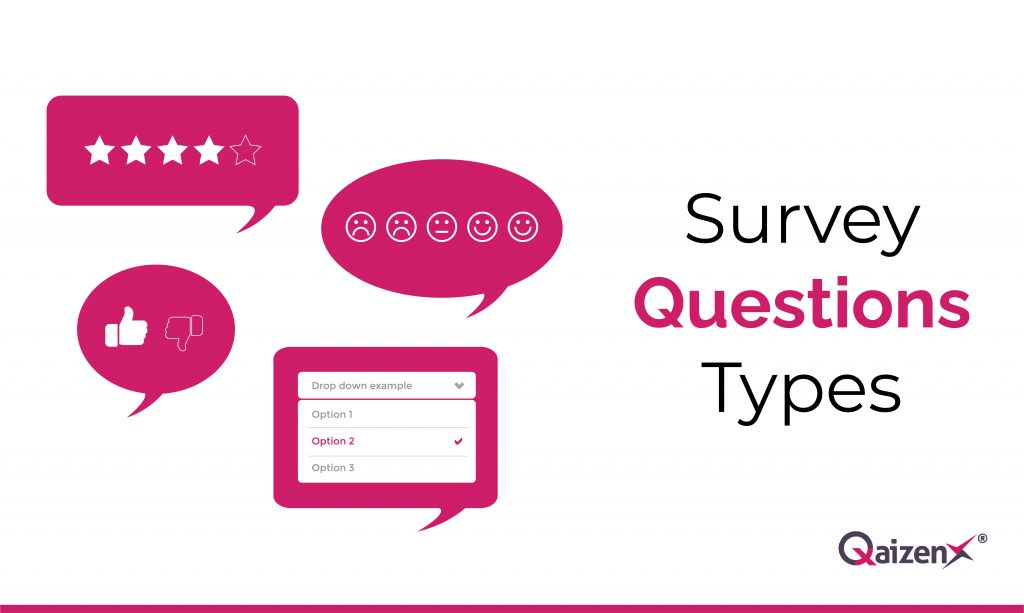6 Types of Survey Questions For Successful Surveys

When you are planning to create a survey it is significant to ask questions in a way to get the answers you want. The way of gathering data and the types of survey questions decide your survey’s success.
There are also other reasons to start taking the survey. Moreover, if you are clear with your goal beforehand, it will be easy for you to select the right types of survey questions. Survey questions can be asked in two formats i.e., open-ended and closed-ended questions.
Depending on your requirement you can select the format of the question type.
For example, in a closed-ended question, there is a list of predefined options, out of which respondents can select their answer. Whereas, in an open-ended question the respondent has an option to write their own thoughts.
Furthermore, there are some factors that determine the types of survey questions:
- Type of information
- Depth of information
Here are the most prevalent types of survey questions that can help you get accurate answers from the respondents.
1. Rating Scale Questions
A rating scale is a general closed-ended survey question type. In this type of question, responders are typically asked to choose from a range of options. Those can be from 1 to 5, 1 to 10, 0 to 10, 0 to 100 or any range, The respondent can select the number which best describes their response.
Check out the following question:
Rating scale: 1 is the worst and 5 is the best.

2. Binary Scale Questions
As binary means two, it’s a “Yes” or “No” type of survey question. This is also a closed-ended survey question type. Quick, simple and reliable survey question type which helps you get more accurate results.

3. Likert Scale Questions
You may have seen this type of survey question many times before. The Likert scale assesses the level of agreement with the statement or the intensity of the reaction of a respondent.
In the below image, respondents can select the response from strongly agree, agree, neither agree nor disagree, disagree and strongly disagree.

4. Semantic Differential Questions
A semantic differential question is a multiple-point rating scale. It is designed to measure the information on where your participants’ view lies on a continuum between two contrasting adjectives. For example, if the one end of the scale is “Very Happy” the other end would be “Very Sad”.

5. Drop-down survey questions
This is also a closed-ended type of survey question where respondents require to select one option from the drop-down list. This is normally used for demographics-type questions where the respondent already knows the response.

6. Multiple choice survey questions
Multiple choice questions are one of the most popular surveys question types. In this, respondents select one or more options from the given list of answers. Multiple choice survey questions are intuitive, easy to use in different ways and help to produce easy-to-analyze data.

7. Open-ended survey questions
In Open-ended survey questions, respondents can write their thoughts and it is intended to elicit more information than any closed-ended survey question type.
With open-ended survey questions, you can discover things that you may have skipped during the survey.

So, we discussed the multiple types of survey questions. Now it’s on you if you want to mix all question types together or go with one. According to the requirements you can select what suits you the best.
Moreover, there are 3 types of surveys. The first one we have already discussed i.e. type of question asked. The other two types are surveys based on the deployment platform and surveys based on deployment frequency
There are tools that can help you to create surveys, QaizenX can help to create surveys effortlessly with predefined templates. Also, you can customize the survey as per your choice and requirement.
Recent Posts
- How People Analytics Can Utilize Data to Drive Business Results
- The Role of AI in Enhancing Employee Feedback Systems
- How Purpose-Built AI Can Help You Build A Great Customer Experience
- Why is Customer Sentiment Analysis Crucial to Your Business?
- Customer Experience Statistics You Need To Know for 2025 | CX Statistics 2024



